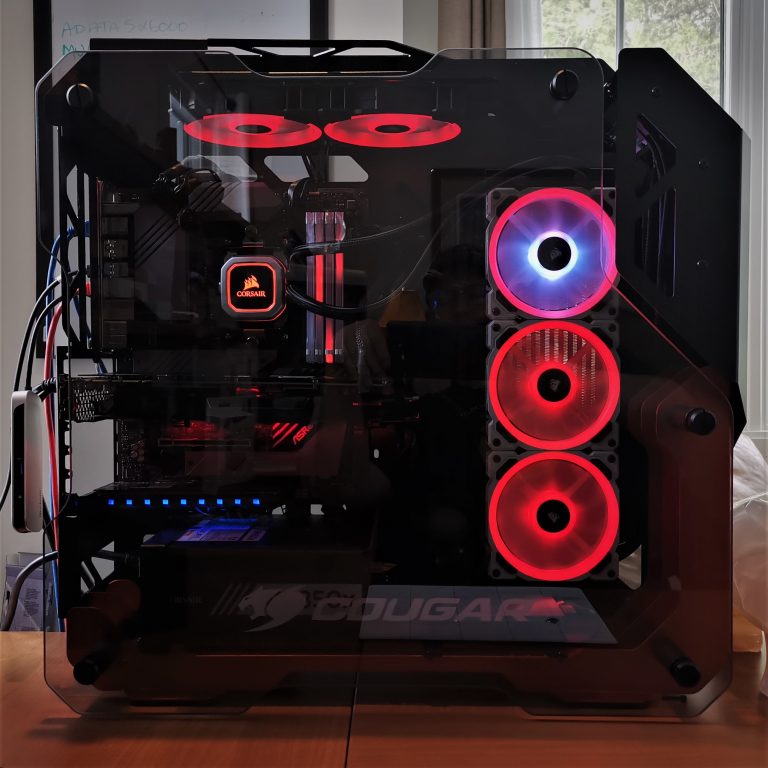TSSDR TEST BENCH AND PROTOCOL
SSD testing at TSSDR differs slightly, depending on whether we are looking at consumer or enterprise storage media. For our XPG Gammix S50 Lite Gen 4 M.2 SSD testing today, our goal is to test in a system that has been optimized and will reach top speeds possible.
We are using a fairly new ASRock X570 Creator Test Bench which is AMD based and contains the AMD Ryzen 3700x Gen 4 CPU. Our PC has been overclocked from 3600Mhz to 4300MHz and memory has been set at a XMP profile of 2667MHz,
SYSTEM COMPONENTS
The components of this Test Bench are detailed below. All hardware is linked for purchase and product sales may be reached by a simple click on the individual item. As well, the title is linked back to the individual build article where performance testing can be validated. Tons of credit to this Cougar Blazer Gaming Case paired with Corsair fans and Corsair iCue RGB software which make this our most attractive case to date
TSSDR ASROCK CREATOR GEN 4 X570 TEST BENCH (link)
| PC CHASSIS: | Cougar Blazer Open Frame Gaming Mid-Tower Case |
| MOTHERBOARD: | ASRock X570 Creator PCIe 4.0 |
| CPU: | AMD Ryzen 3700x |
| CPU COOLER: | Corsair Hydro H150i Pro RGB 360mm Liquid Cooling |
| POWER SUPPLY: | Corsair RM850x 80Plus |
| GRAPHICS: | MSI Armor Mk 2 Radeon RX570 OC |
| MEMORY: | Corsair Vengeance LPX DDR4 3600MHz |
| STORAGE: | Intel Optane 905P 1.5TB SSD |
| KEYBOARD: | Corsair K57 Wireless Gaming |
| MOUSE: | Corsair Dark Core RGB SE Wireless BT Gaming |
| OS | Microsoft Windows 10 Pro 64 Bit |
BENCHMARK SOFTWARE
The software in use for today’s analysis is typical of many of our reviews and consists of Crystal Disk Info, ATTO Disk Benchmark, Crystal Disk Mark, AS SSD, Anvil’s Storage Utilities, AJA, and TxBench. Our selection of software allows each to build on the last and to provide validation to results already obtained.
Crystal Disk Info is a great tool for displaying the characteristics and health of storage devices. It displays everything from temperatures, the number of hours the device has been powered, and even to the extent of informing you of the firmware of the device.
Crystal Disk Info validates that our SSD is running in PCIe 3.0 x4 (four lane), and also that NVMe 1.4 protocol is in use. More importantly though is the fact that we have this SSD running for several hours at normal operating temperatures that we might see in any Gen 3 SSD. Our Sabrent 4TB Rocket Q4 system disk is running at 38°C while the S50 Lite runs just a bit higher at 42°C…with no other means of heat dissipation.
ATTO Disk Benchmark is perhaps one of the oldest benchmarks going and is definitely the main staple for manufacturer performance specifications. ATTO uses RAW or compressible data and, for our benchmarks, we use a set length of 256mb and test both the read and write performance of various transfer sizes ranging from 0.5 to 8192kb. Manufacturers prefer this method of testing as it deals with raw (compressible) data rather than random (includes incompressible data) which, although more realistic, results in lower performance results.
 The SSD Review The Worlds Dedicated SSD Education and Review Resource |
The SSD Review The Worlds Dedicated SSD Education and Review Resource | 


Considering the specs, wouldn’t it reach similar performance installing it in a PCIe Gen 3 slot?